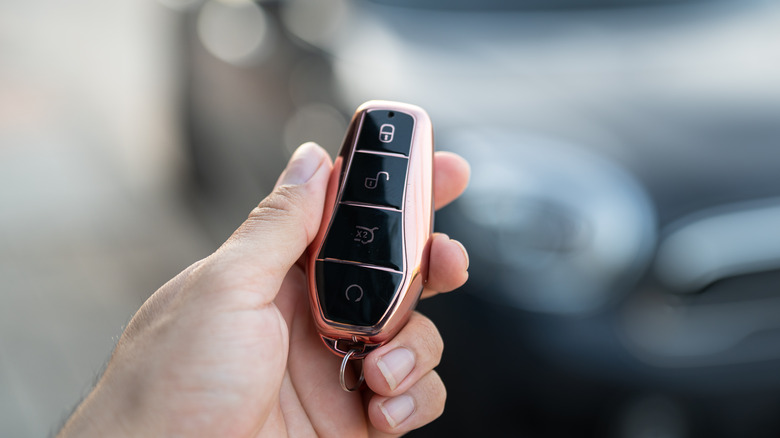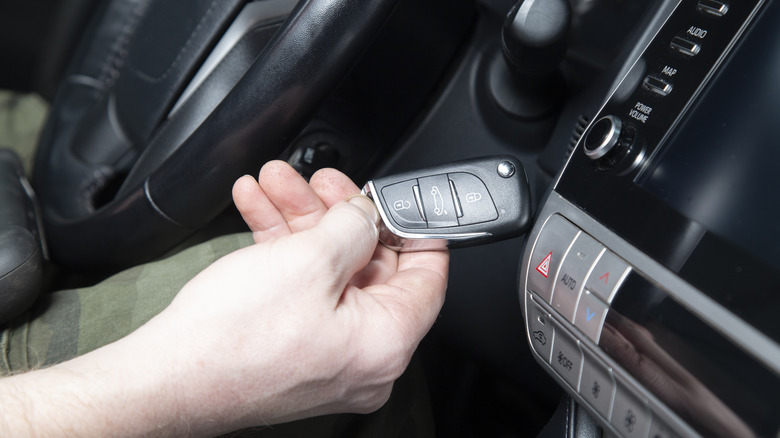What Does An Engine Immobilizer Do & How Much Do They Cost?
We may receive a commission on purchases made from links.
Around mid-2021, cities across the U.S. witnessed a sharp increase in the number of car thefts. Upon analysis, it became clear that most of these thefts primarily affected cars made by two companies: Hyundai and Kia. Milwaukee was a hotbed of these thefts with the city experiencing a massive 2,500% increase in the number of car thefts at the time.
It didn't take investigators long to figure out what was happening. The people behind these thefts were a group of teenagers who identified themselves as the Kia Boys. These youngsters had discovered a major vulnerability with certain Kia and Hyundai vehicles that made them easy targets.
As it turns out, several Kia and Hyundai models sold in the U.S. between 2011 and 2022 came with a steel key for starting the car. Thanks to their antiquated unlock and ignition mechanism, these vehicles lacked an engine immobilizer — a device that electronically locks a vehicle and prevents the engine from starting. Anyone wanting to steal one of these Kia and Hyundai cars had to simply break in and bypass the weak security system of the car and get away.
Kia's decision not to include an engine immobilizer in the affected cars ended up causing them massive financial and reputational damage. The company had to issue a recall for all the cars affected and even ended up facing a class action lawsuit. Needless to say, Kia and Hyundai rued the decision not to include an engine immobilizer on some of their cars.
But have you ever wondered what exactly an engine immobilizer does, how expensive they are, and if you can add one to your car if you don't have it as part of the standard package? Let's investigate.
What is an engine immobilizer?
An engine immobilizer does exactly what it says: It helps to ensure a car's engine can only be started by the owner. It is, for all practical purposes, a factory-fitted anti-theft device for your vehicle. Consider it an invisible electronic locking mechanism for your car's engine that makes it tough for thieves to access the car's electrical systems and drive away with it.
Early forms of engine immobilizers have been around for a long time as the system was invented back in 1919 by St. George Evans and Edward Birkenbeul. It would take more than 60 years since its invention for the engine immobilizer to be introduced into modern-day cars as the technology started to trickle down to vehicles made in the '70s and '80s.
While early versions of engine immobilizers were simple devices that often used magnetic key systems, over time, they have evolved into more sophisticated systems that involve car keys and smart key fobs with wireless transponders that send and receive signals from an engine's ECU (engine control unit). The engine will not start if it does not receive the correct code from the key. Today, engine immobilizers have become standard equipment on almost all models of ICE (internal combustion engine) cars sold in the U.S.
According to a 2016 study that appeared in The Economic Journal, the introduction of engine immobilizers on cars has reduced car theft by a significant 40%. This piece of technology has become a crucial barrier against car thefts.
How much does an engine immobilizer cost?
If you are driving a modern-day car with an electronic key, chances are that it already has an engine immobilizer. If you are still worried about your car being stolen, you can install additional anti-theft mechanisms on your vehicle, which may include steering locks, car alarm systems, wheel locks, and GPS-based vehicle tracking systems, all of which further enhance the safety of your car.
On older vehicles that don't have an engine immobilizer, you can install a standalone, third-party module that will add the functionality to the vehicle. Today, there are several products in the market that claim to bring engine immobilizer features to vehicles that don't have them as standard. The prices of these products vary and typically cost less than $50.
Most products that feature engine immobilizer functionality are standalone devices that only offer that one feature. For additional theft protection, owners of older cars could invest in features like GPS-based car tracking and motion sensing. Adding these features to an older car will almost certainly require the installation of separate hardware, with some GPS-based features hidden behind a monthly subscription fee.
Immaterial of what you end up choosing, you will almost certainly need to get these devices installed by a professional mechanic. In fact, if you are considering getting any anti-theft features, the best option would be to consult a reliable mechanic before making a purchase decision.


